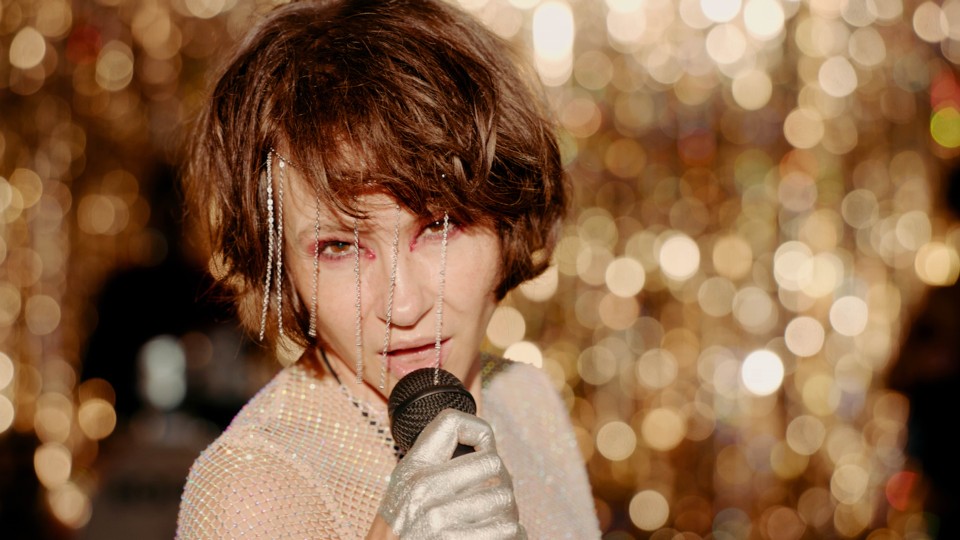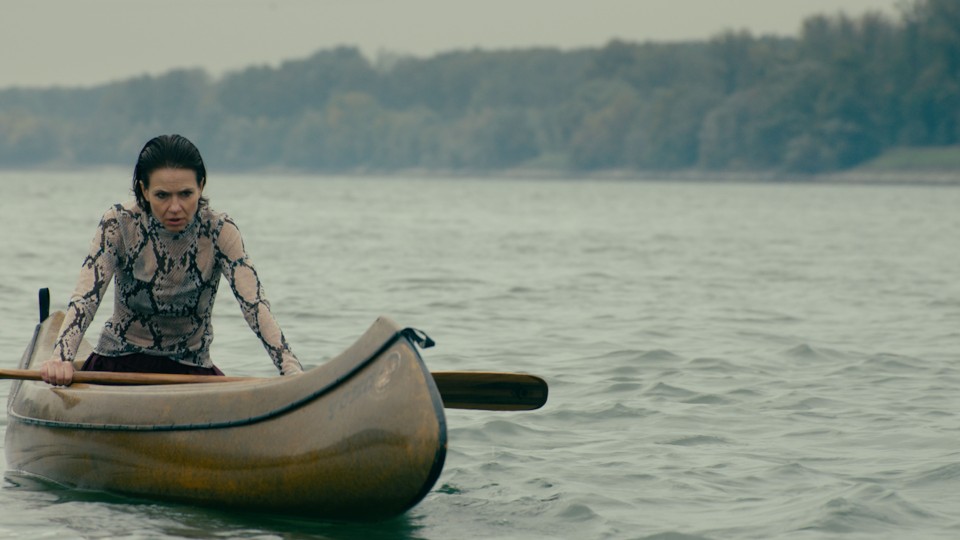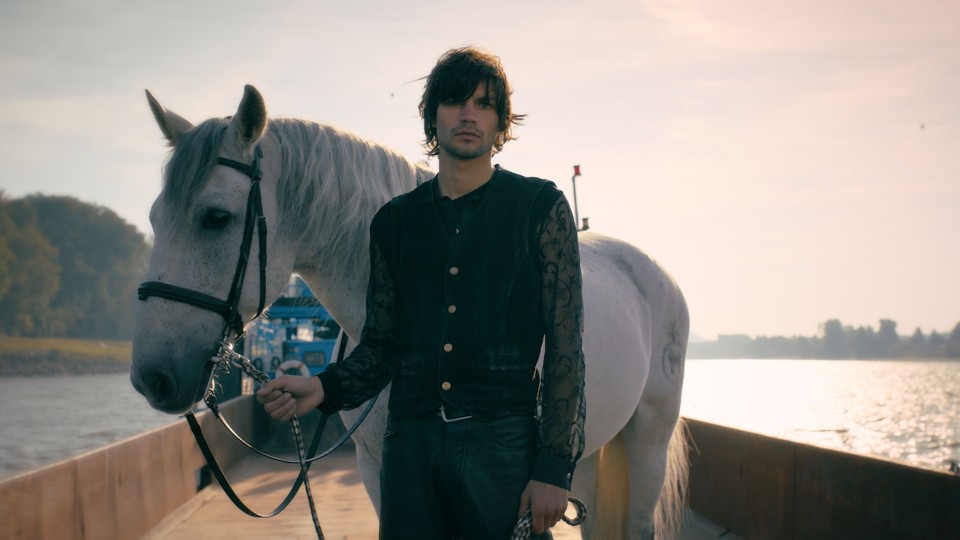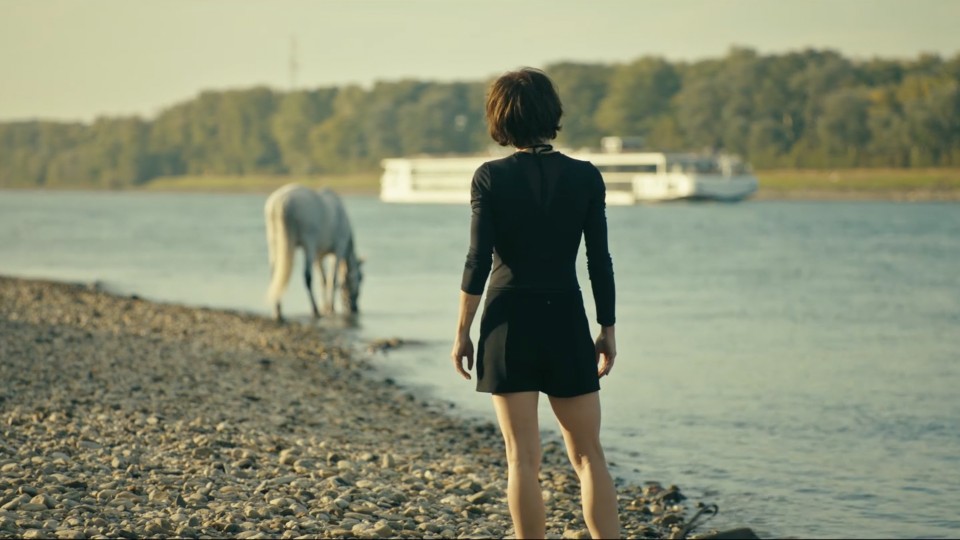An Austrian musician in the 90s who dreamed of being signed by a major label actually did stand a chance, because scouts were
even roaming even the provinces in search of talent. When a record deal from London beckoned, Helen followed the lure of international
success, leaving more than just the other members of her band behind in the village on the Danube where she grew up. In Evi
Romen's HAPPYLAND, a woman in her 40s returns home with no money or glamour left, somehow lost between reality, desires that were pursued and
opportunities that were missed.
It's possible to see a parallel between your previous film, Why Not You, and HAPPYLAND, since both films feature a story of homecoming or departure as well as the theme of not being in the right
place. Do the contradictory forces that influence a person's decisions in life represent one of the central issues that engage
you artistically?
EVI ROMEN: I think that theme is central to everyone's life: Where do I come from, where am I going, and what do I do in between? Am
I in the right place? My background in South Tyrol, a bilingual area with a difficult history, might mean this is also in
my genes, but I believe it’s a fundamental element in the hearts of all people. And it includes the losses that can possibly
ensue from a decision for something. You think you're dealing with something very personal when you're writing, and then you
realize that most people are faced with similar questions, especially when it comes to something like a feeling for home or
a path in life.
While the focus in Why Not You was more on social inequality, in HAPPYLAND it is on a woman who leaves a lot behind for her
artistic career. Helen is a woman who doesn’t meet the social expectations thrust upon her. Despite the universality of this
subject, are you foregrounding the point that a woman is undertaking a huge task when she lives out her dream, or at least
tries to?
EVI ROMEN: Helen is a character who stopped at nothing and now looks back on the damage she has caused – to herself and others – with
the awareness that she didn’t really achieve success. In the history of film and literature, it’s usually men who go out into
the world and act with a certain ruthlessness in fulfilling their longings. I was very interested in creating a character
of that sort who is a woman; after all, I know women like that, and this behavior is not purely male; the basic idea, the
longing, is gender neutral.
The fact that your main character is trying to succeed in the music scene is perhaps also connected with your affinity for
music. What was the music business you depict really like in the 90s?
EVI ROMEN: That HAPPYLAND is set in the music scene certainly has something to do with the fact that I once had a record label, together
with Sebastian Brauneis and – like many others – failed miserably. In the early 2000s, there was a spirit of optimism in the
indie world, with major labels also trawling the depths of provincial Europe for local bands. At the same time, I saw dreams
being shattered very quickly and people paying a high price for short-lived success. But the real reason for choosing the
music scene was different: I wanted a character who lives out the longings we all have but don’t dare act upon. We tend to
choose idols who live very different kinds of lives. Everyone would like to be cool, to be on stage or live a rock'n'roll
forever lifestyle. Pop and rock stars embody these unlived desires, but naturally most of us don’t want the consequences of
great success, which may include drug addiction, deprivation, depression, etc. We prefer to get that from the gossip columns.
I wanted my character Helen to show a life where people try to have dream lives, with the price that sometimes must be paid
for living out longings, especially as a woman.
The action of HAPPYLAND takes place on the banks of the Danube. What thoughts about the river played a role in your choice
of location?
EVI ROMEN: I love symbolism, even if it sounds a little kitsch. I wanted HAPPYLAND to be about the river of life. The Danube seemed
like a good choice, because it’s a river with every possible facet, sometimes fast-flowing and sometimes virtually stationary,
sometimes flooding and sometimes almost drying up. A river like the Danube is the perfect metaphor for life. The main character
returns to her hometown on the river, and this river tells a parallel story: it’s very quiet, almost motionless – just like
Helen in this week when the story is set. There is no progress, but you sense a looming threat, and finally she starts moving.
Andrea Wenzel takes the part of the main character, Helen. She had to play a musician plausibly while also conveying who she
was at the age of 20. What type of person were you looking for?
EVI ROMEN: At first, I was looking for a completely different type: an older woman who has come unstuck, who bears the hallmarks of
partying for 30 years and who hasn't understood that rock'n'roll is over for her. But I couldn’t find that woman, despite
so many rounds of auditions, which surprised me a lot. At the last casting, Andrea Wenzel was on the list, and my first reaction
was: "Too young. Too beautiful." But then she impressed me with her acting, and she made me aware of something I was also
happy to play with: the idea of being an eternal teenager. That desperate attempt to remain slim, young, fit and cool conveys
something similar to my original idea. Andrea threw herself into the part very courageously, without any vanity.
Though the main character in HAPPYLAND is so prominent, the supporting characters are also very significant in their minor
roles. What was your approach towards creating these secondary characters, who portray provincial existence?
EVI ROMEN: The task was to create the nest that Helen escaped from. I wanted to make it as authentic as possible, while at the same time
showing in concrete terms why Helen became the person we meet in the film. I also had to tell the story of the last thirty
years within the time frame of the film action, which extends over a week. I came up with long backstories for everyone. I
show the mother, Helene Sr., as someone with a certain sophistication; we see that she had the potential but not the will
to achieve something bigger. At the same time, I gave her an extremely cold manner, possibly a kind of defensive technique
because she never got out of there. The other figures were simple. For the members of the band, I just had to look at the
lives of various friends from the old days and see what became of them. I didn't want to fall into the trap of portraying
all those who stayed behind as losers who never had proper careers; I also wanted to convey some satisfaction. The fundamental
issue of this film relates to the life you didn't live, and the question of which of the two would have been better. Helen
decided to pursue her desires, to dare to attempt something. The others didn't dare do that, so they just made livings for
themselves. I see both as equally valid. But I believe that just as those who were left behind are envious when they look
at those who left, the opposite also applies. While we may feel the longing to go out into the big world, we always have some
trace of desire for a conventional existence, too.
HAPPYLAND won the Diagonale Award for Best Film Music. How did the music take shape in the film, in its various facets?
EVI ROMEN: I wanted to make a film about a musician rather than a music film. The first idea was to portray her life without any music
at all; I certainly didn't want to commit myself, musically, when I was writing the script. The only thing I felt sure about
was that the music from Helen's youth had to be punk, and then I ended up showing that in the flashbacks, because I thought
we should at least see a number being composed. I very deliberately showed a song that isn’t exactly stunning, that might
have been good but gets stuck somewhere. The basic theme of the film is stagnation, getting stuck, a kind of paralysis brought
on by the shock of realizing: I've come this far, but which direction do I take now? The music in the present had to be more
in line with the spirit of today. And I think there’s a lot going on in the folk singer-songwriter area just now, especially
with women artists. That's how Alicia Edelweiss came on board; I wanted a musician that gives you a sense of strength and
new departures. I chose Dorit Chrysler as the composer because she has a similar life story – ending with more success, thank
God. She moved from Graz to New York at an early age, without her band, and stayed there for 35 years. Dorit's main instrument
is the theremin, and the movements made while playing it correspond to the movements of the Danube. It was important to find
a woman composer who knew what I was talking about.
In the opening credits we see Helen in a variety of perspectives and outfits. Paul says at a different point: "It's our light,
not our darkness, that frightens us." To what extent is HAPPYLAND a statement about the many facets a life can adopt, and
about the risks on the road to success, including the risk of failure?
EVI ROMEN: The various facets of Helen we see at the beginning aren’t all so great; they’re actually a bit clumsy. I wanted to show
an average woman who may not be as talented as she thinks she is. My idea was to show a woman who had the guts to attempt
something with a certain self-confidence – in the 90s women were doing that, as well as men – without asking herself whether
she really was good enough. Today we have returned to a point where women don’t trust themselves enough. Women don't dare
to do something, because they're afraid they're not good enough. Men find it easier to reach for the stars. It was important
for me to present a character who acts with the natural confidence of a man, comes to terms with her own mediocrity without
hesitation – and still reaches for the stars.
Interview: Karin Schiefer
April 2025
Translation: Charles Osborne








